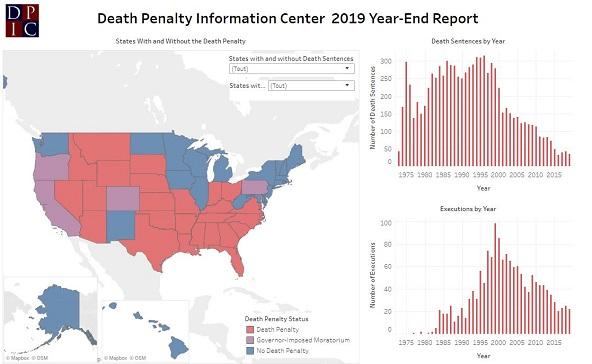
DPIC Report on the 2019 Death Penalty Usage in the US
Statistics
A year-end report published on 17 December 2019 by the Death Penalty Information Center highlights the death penalty usage in the US, public opinion, federal death penalty, and problematic executions.
While the trend towards abolition continued in 2019, marked by California imposing a moratorium, New Hampshire abolishing death penalty, and other states further limiting the circumstances to impose death penalty, the report equally highlights the persisting problems of death penalty in the US.
Progress Towards Abolition
As recorded and projected by DCIP, the use of death penalty remained near historic lows this year with a total of 22 executions, between 35 and 37 new death sentences, and 2,656 people on death row throughout the country.
Of these, more than one third (34.1%) of all people on death row in the USA have their executions on halt under a governor-moratorium. California is the latest state to do so on 13 March 2019, following the Governor Gavin Newsom’s announcement that racial discrimination, lack of deterrence value, and the high cost of capital punishment are signs of the “failure” of death penalty. This significant move has put California with the biggest death row population (729 as of 2019) on a similar boat as Colorado, Oregon, and Pennsylvania.
Another remarkable news comes from New Hampshire, which becomes the 21st state to abolish the death penalty on 30 May 2019. Rep. Renny Cushing, a sponsor of the bill, quoted the importance of voices of murder victims’ family members, law enforcement, and the people that echo the objection towards death penalty.
Federal Death Penalty and Judicial Error
Despite the significant progress towards abolition that that DCIP has reported in 2019, the abolitionist movement in the US still has a lot to work on. On 25 July 2019, the US Department of Justice (DOJ) announced its intention to reintroduce federal death penalty after a 16-year hiatus. This sudden move has raised serious questions on the rulemaking procedures to adopt the execution protocol and has been followed by a federal lawsuit. On 20 November, executions scheduled for December 2019 and January 2020 were halted by a Federal Court, and on 6 December, the United States Supreme Court denied an application by the U.S. Department of Justice to lift the federal court injunction blocking the federal government from carrying out executions.
On state level, “this year’s executions did not represent the worst of the worst crimes and offenders, but the most vulnerable defendants and those whose trials and appeals were the least reliable,” DPIC wrote. 19 out of the total 22 prisoners executed this year had either one or more of the following: serious mental illness, chronic childhood trauma, or brain injury/intellectual disabilities.
As is the case with issues of innocence that stood out in 2019, with four men exonerated after having spent more than 40 years in prison such as Clifford Williams, Jr. and Charles Ray Finch. Additionally, executions of those with strong likelihood of innocence, such as Domineque Ray, further demonstrates the concern. This highlights the fact that judicial error continues to happen and death penalty as irrecoverable punishment faces the risk of executing an innocent person.
Read the full report here.
Categories
United States





